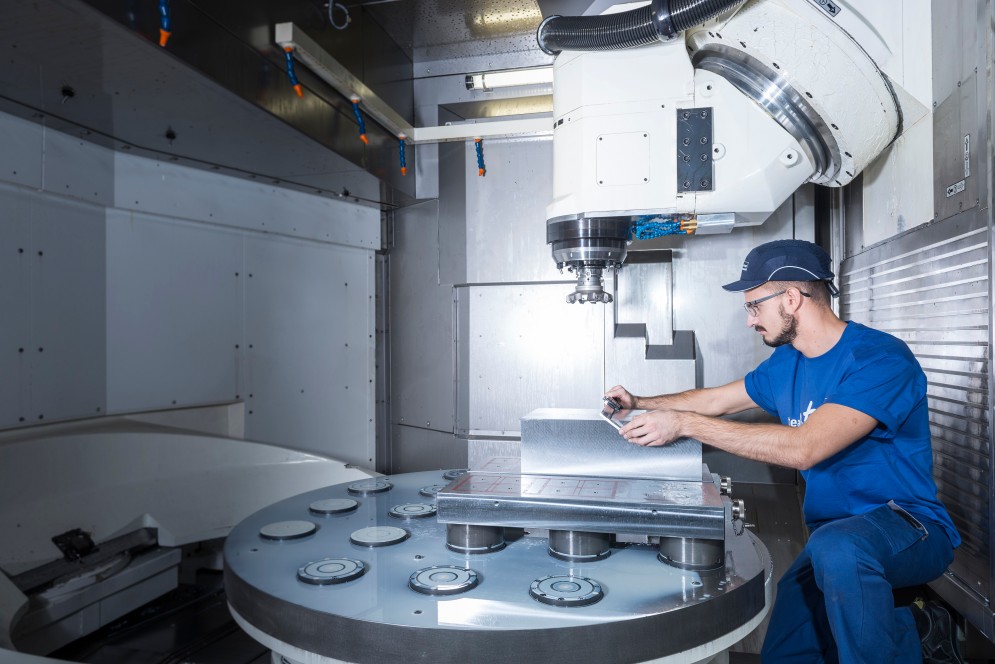The Digital Transformation of Manufacturing: Industry 4.0

The IIoT platform toii® determines and analyzes basic data from 40 manufacturing components at thyssenkrupp Materials Schweiz AG – and thus serves as the basis for optimizing production.
The challenge for thyssenkrupp Materials IoT
thyssenkrupp Materials Schweiz AG supplies customers in the B2B sector with premium metals, including tool steel, powder metallurgy steel, stainless steel, structural steel, and many non-ferrous metals. Alongside pure distribution, the company also boasts an extensive range of machinery with a diverse number of processing options. Its key competences lie in chipping production – sawing, milling, grinding, deep hole drilling and 5-axis machining. It produces metallic semi-finished products with the highest quality requirements that are used in additive manufacturing, the aerospace industries, plastic injection molding applications, the watch industry, and medical technology.
The plant’s commitment to high quality means that it must continually monitor the machines and react quickly to any change in their statuses. A long-term analysis on the productivity of individual machines previously involved time-consuming logging and evaluations.
These processes were to be digitalized to prepare the company for its leap forward into the era of Industry 4.0. In doing so, the operating times and availabilities of all machines were to be automatically collected, made transparent, and manufacturing processes optimized.
The solution design
Specialists from thyssenkrupp Materials IoT worked on the solution together with colleagues from thyssenkrupp Materials Schweiz.They opted for toii® – the Industrial Internet of Things platform (IIoT) developed by thyssenkrupp Materials IoT to collect and merge the machine data.
The full range of machinery was connected to the IIoT platform using modules that had also been developed within the company. The modules determine the status of the respective machine, and transmit the report to toii® in the form of digital data. The IIoT platform processes this basic data, analyses it, and presents the results in a clear overview on a dashboard. Potential status changes are detected early on, downtimes are reduced, and machine productivity is increased.
Both modules required – toii®.Lights and toii®.Fusion – were connected to the 40 machines at thyssenkrupp Materials Schweiz in the first expansion phase. The production facilities originate from different manufacturers and different construction years. Some are operated manually, while others are fully automatic. The spectrum ranges from saws, to surface grinding machines, deep hole drilling and milling machines, right through to CNC machining centers.
toii®.Lights is an easy and intelligent retrofit solution for heterogeneous machines with no direct data connection. The system consists of a box with buttons and a signal beacon mounted to it. Once the electric and network side of the module is connected, it will automatically log on to the toii® platform; the system can be deployed after simple configuration and assignment to the machine. Mounting and set-up for one unit takes two hours on average and can be performed by just one person.
In addition to the basic data collection (machine is in operation/not in operation), the machine also features an interface to allow the production worker to enter additional data directly into the toii® platform database. This is especially useful for failure and status reports. In order to maintain a better overview, the machines statuses in the production line are also displayed directly via toii®. Lights using stack lights on the machine, allowing the machine operator to detect any deviations immediately. An automatic escalation can also be enabled.
The collection and central storage of machine data does not offer added value in and of itself – it is essential to structure the data, display it graphically, and evaluate it according to individual requirements with the aid of big data analytics. To this end, all data sets collected from the machines are processed in the toii®.Fusion module and shown on displays tailored to the individual customer.
In addition to the real-time display of the machine statuses, another display option comparing the machine operating times is available. At thyssenkrupp Materials Schweiz, they are now used by the production team as a basis for debriefing the production shifts and to identify additional areas for optimization within the scope of the company’s own operational excellence initiative.
Customer benefit
The full range of machinery at thyssenkrupp Materials Schweiz AG could be connected to the digital IIoT platform toii®. Merely automating processes made it possible to reduce downtimes by over 10 percent. toii®’s user interfaces enable the employees to operate the platform efficiently and ergonomically. Various paper-based, handwritten procedures have also been eliminated from the processes and replaced by digital datas. Media disruptions were prevented and thus also errors, such as those that could occur when rendering handwritten notes into digital documents.
Since commissioning, all information for production management that has been delivered by toii® is also fed back into the ongoing improvement of production processes. Technical sources of errors are detected and can be effectively eliminated.
The following optimization potentials were achieved with the aid of the logs, evaluations, and structured analysis of machine statuses:
By depicting the statuses on a dashboard, workers can react quickly in the event of failures or disruptions to restore productivity. For example, production failures due to missing material or electrical/mechanical machine errors can be identified straight away. The relevant personnel can be notified immediately.
Long-term logs – or in other words, the accumulation of machine data – allow individual machines to be compared as well as a smart data analysis of recurring failures to be displayed. Measures for improvements can be planned and implemented using these results, and their success evaluated and quantified.
The utilization rate of the machines becomes visible. Depending on the batch size and the degree of automation of the machine, an improvement in efficiency can be achieved by optimizing order and machine planning.
Thanks to the increasing level of automation and resulting optimizations, employees’ workloads are reduced so that they’re much more available for additional productive services. Recurring disruptions to work due to downtimes have significantly decreased.
